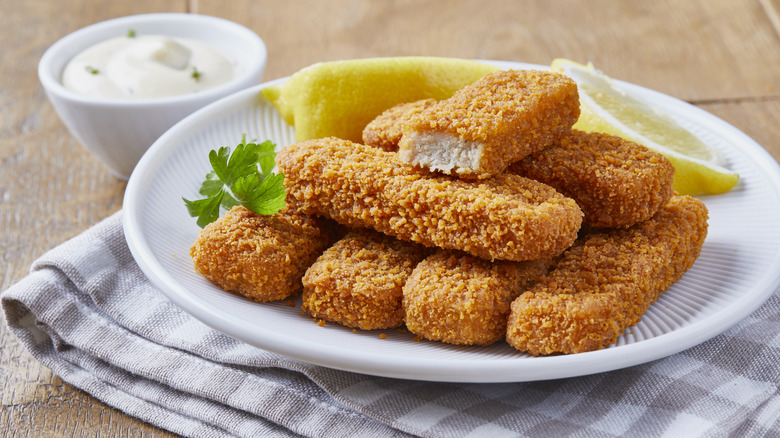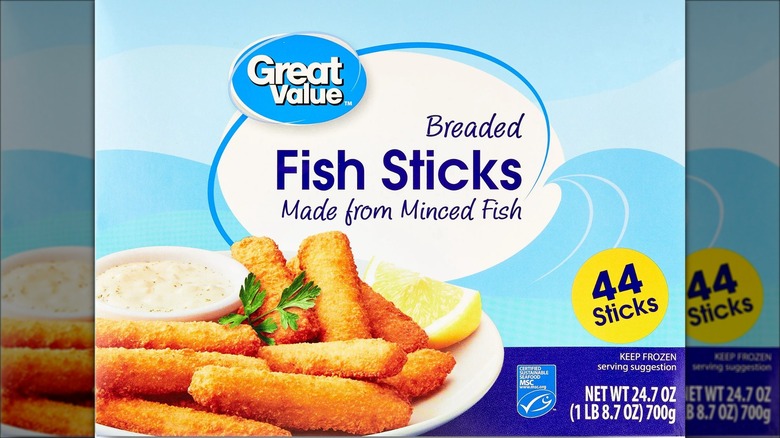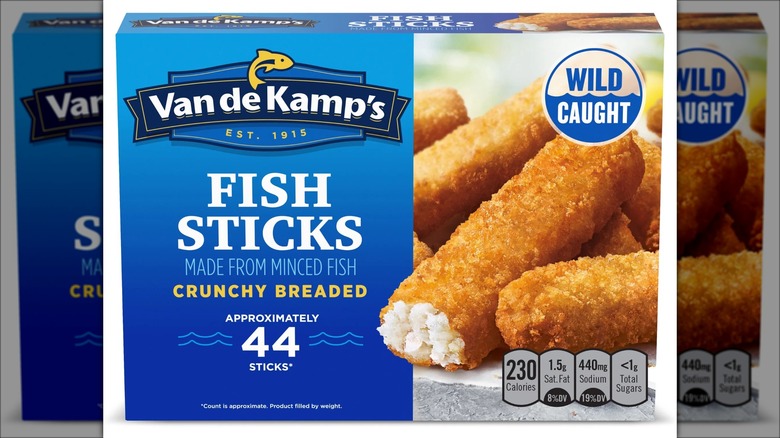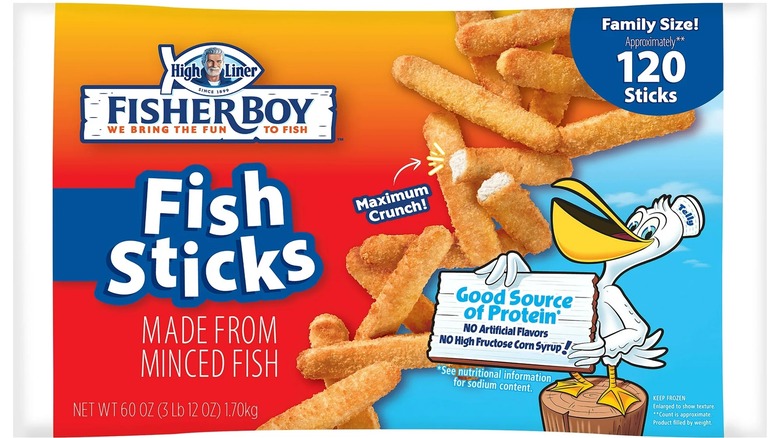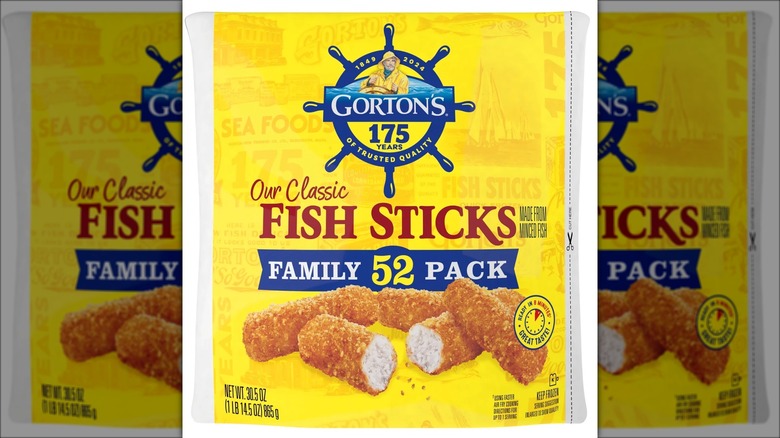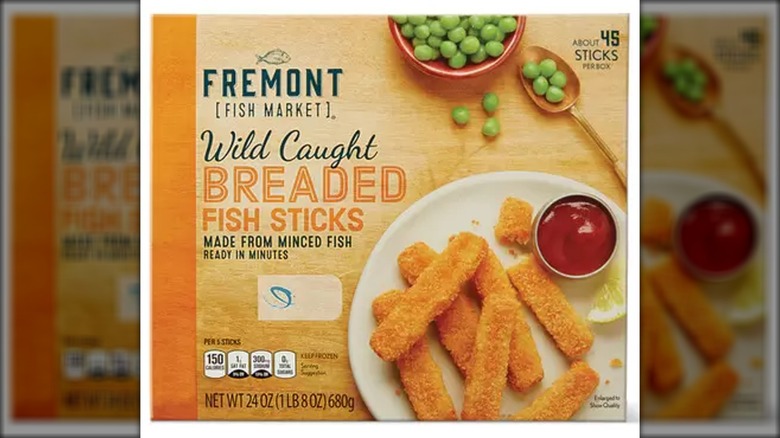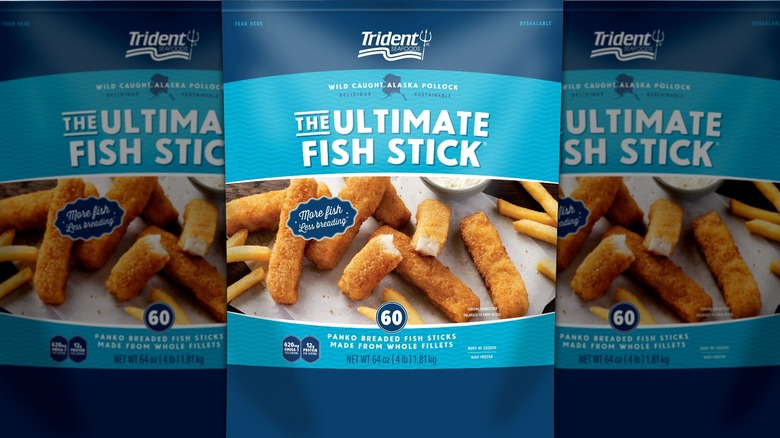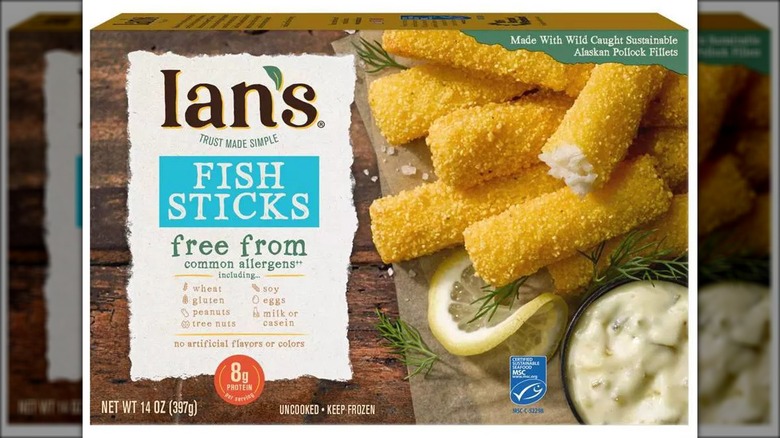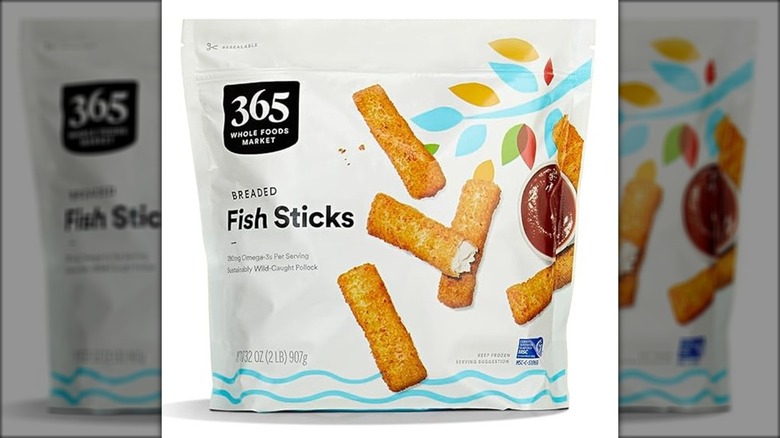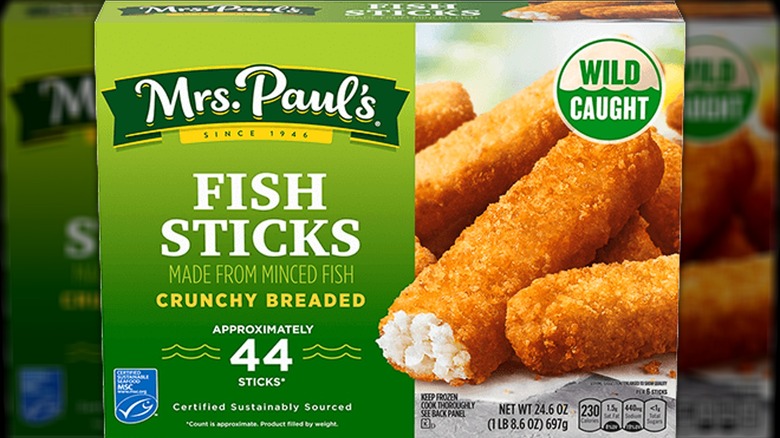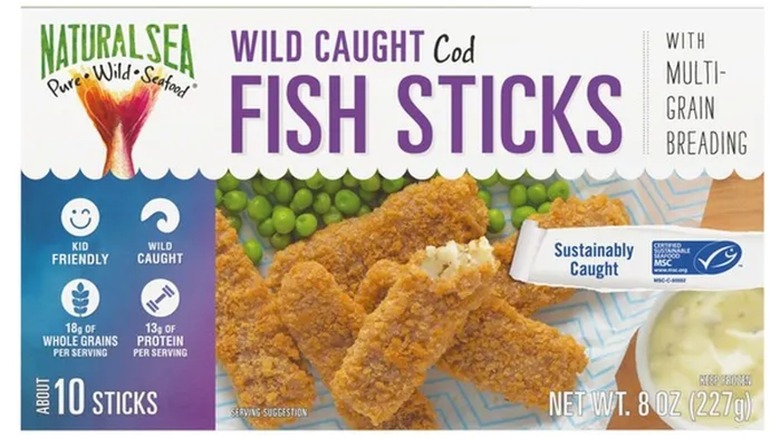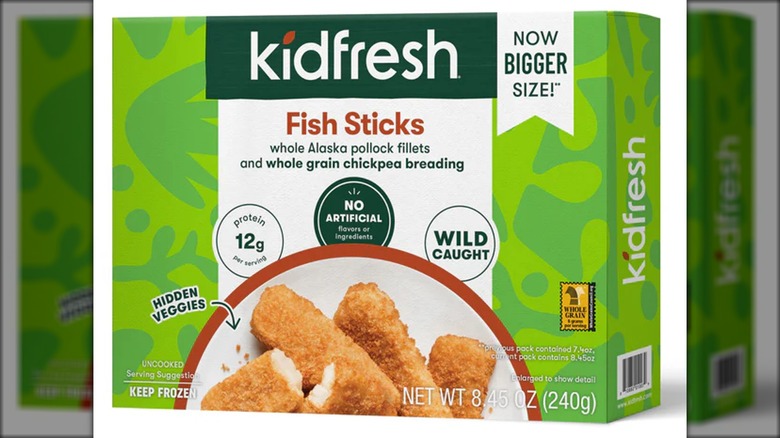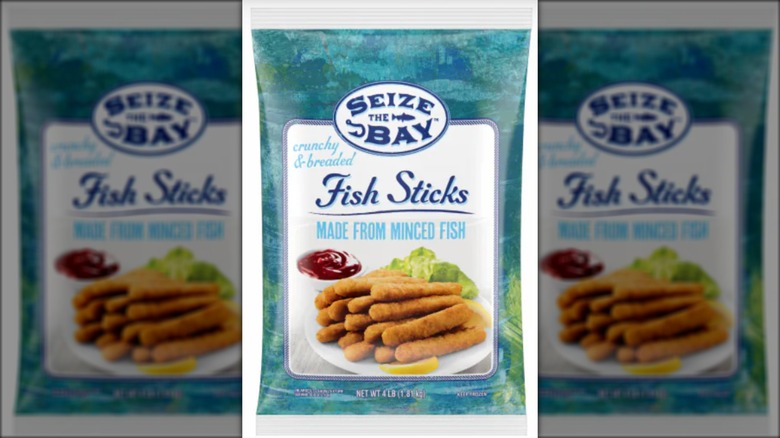12 Of The Unhealthiest Frozen Fish Sticks You Can Buy
We may receive a commission on purchases made from links.
Frozen fish sticks, also known as fish fingers, were first introduced to the American market in the early 1950s. They quickly became a staple of peoples' diets, thanks to savvy marketing, affordability, and the fact that frozen fish sticks can be prepared and served in many ways. Today, there are many brands available, some of which are healthier than others.
In this article, to help you make informed choices when shopping, we're focusing on fish sticks that contain the most saturated fat and sodium. These are two nutrients that frozen fish sticks are generally high in and are also two things that many Americans consume too much of. Cutting down the consumption of these is vital, as excessive saturated fat and sodium have a slew of impacts on human health including raising cholesterol levels and blood pressure.
We also took into account how heavily processed the fish sticks were, as regularly consuming ultra processed foods has been linked with many negative impacts on health including chronic inflammation. We measured this by examining the length of ingredient lists and by looking for additives including preservatives, colorings, and flavorings. Finally, we also examined the amount of micronutrients, such as vitamin D, the fish sticks contained. Those that contained only a scarce amount of micronutrients were included in this list as these nutrients are vital for the production of various substances including hormones.
Great Value Breaded Fish Sticks
Great Value, one of Walmart's most popular in-house brands, is known for producing a large array of cheap food products, some of which are decidedly unhealthy. As the brand's name suggests, the majority of these products are competitively priced. This is true of the Great Value Breaded Fish Sticks which retails at under $6 per 24 ounce box.
Making a product as affordable as possible necessitates the use of some cheap, and often unhealthy, ingredients. This is reflected in Great Value Breaded Fish Sticks' nutritional profile. A 112 gram serving of these tilapia fish sticks contains one gram of saturated fat and 440 milligrams of sodium. This is respectively 5% and 19% of an adult's daily value, the recommended amount of a nutrient that an adult should consume per day.
In terms of micronutrients, these fish sticks perform slightly better. The 112 gram serving contains 2.6 micrograms of vitamin D, 15% of an adult's daily value. Unfortunately, Great Value's fish sticks also look to be quite heavily processed. The ingredient list is long and contains several additives including the coloring agent yellow 5 lake (tartrazine), giving further indication that Great Value Breaded Fish Sticks are some of the unhealthiest around.
Van de Kamp's Wild Caught Crunchy Breaded Fish Sticks
A recommended serving of Van de Kamp's Wild Caught Crunchy Breaded Fish Sticks is 17 grams lighter than the recommended serving of Great Value Breaded Fish Sticks. Nonetheless, this smaller serving contains 1.5 grams of saturated fat, 50% more than the Great Value fish sticks contain. This 1.5 grams amounts to 8% of an adult's daily value — a concerning amount considering that this comes from a only few fish sticks. One possible reason for this high saturated fat content is that these fish sticks have an abnormally thick layer of breading. During the precooking phase of production, this breading absorbs a lot of oil during frying, resulting in a product with a high fat content.
Van de Kamp's Wild Caught Crunchy Breaded Fish Sticks also contain 440 milligrams of sodium per recommended 95 gram serving. This means that, on a gram-for-gram basis, Van de Kamp's fish sticks contain more sodium than not only the Great Value fish sticks, but many other fish stick products that are available for purchase.
Things get even worse when looking at micronutrients. This same serving of fish sticks contains no vitamin D or calcium and only 0.6 milligrams of iron and 100 milligrams of potassium, 4% and 2% of an adult's daily value respectively. On the flip side, Van de Kamp's fish sticks don't seem to be overly processed. They are made with minced pollock and 16 other ingredients, with no colorings among them.
Fisher Boy Fish Sticks
Fisher Boy Fish Sticks is a product that's stocked by major grocery store brands including Walmart and Kroger, a store known for selling high quality fish. This product has the dubious honor of containing the most sodium per serving in this entire article with a 109 gram serving of the fish sticks containing a shocking 640 milligrams of sodium, 28% of an adult's daily value. This is a huge proportion of an adult's sodium intake, especially considering that it comes from a mere eight sticks.
To make matters even worse, a 109 gram serving of Fisher Boy Fish Sticks also contains two grams of saturated fat. This is 10% of an adult's daily value, again a large proportion to come from a small amount of food. To put these values into perspective, this 109 gram serving of Fisher Boy Fish Sticks contains the same amount of saturated fat and just under two and half times more sodium than a medium serving of McDonald's french fries.
Fisher Boy Fish Sticks do contain a respectable amount of micronutrients. While the 109 gram serving boasts no vitamin D, it does contain 40 milligrams of calcium, 1.8 milligrams of iron, and 340 milligrams of potassium. These amounts are equal to 4%, 10%, and 8% of an adult's daily value. However, the fish sticks are highly processed. Not only are they made from a blend of four different fish, but the ingredient list also contains several flavorings and colorings.
Gorton's Crunchy Breaded Fish Sticks
Customers frequently name Gorton's Crunchy Breaded Fish Sticks as one of the best ranked frozen fish stick products in the country. Happily, this quality does not translate into an extremely unhealthy product. Gorton's Crunchy Breaded Fish Sticks contain one gram of saturated fat per 79 gram portion which is approximately five sticks. This is equal to 5% of an adult's daily value, demonstrating that one portion of these fish sticks does not pose much of an issue when it comes to saturated fat. Of course, the saturated fat content will grow if someone eats more than the suggested serving size.
Gorton's Crunchy Breaded Fish Sticks do contain a significant amount of sodium, though. A 79 gram serving boasts 310 milligrams, just under 15% of an adult's daily value. While around the norm for the products included in this article, over 300 milligrams of sodium in such a small serving of food marks Gorton's Crunchy Breaded Fish Sticks as an unhealthy choice.
A lack of micronutrients further reinforces this. The 79 gram portion contains one microgram of vitamin D, equal to 6% of an adult's daily value but only 20 milligrams of calcium and 179 milligrams of potassium. More concerningly, the fish sticks contain no iron. That being said, Gorton's Crunchy Breaded Fish Sticks do have the shortest ingredient list of any product in this article with only three ingredients named: Minced pollock, breadcrumb coating, and vegetable oil, indicating that this product isn't overly processed.
Fremont Fish Market Wild Caught Breaded Fish Sticks
Fremont Fish Market is the in-house brand that Aldi uses to sell the majority of its seafood. As with many other home brand Aldi products, these fish sticks — which are made with Alaskan pollock — are a cheap item on par with many more expensive competing products. This is especially true in a nutritional sense. Instead of being laden with saturated fat as some other cheap fish stick products are, Aldi's product only contains one gram of saturated fat in every 78 gram serving.
When it comes to sodium content, the Fremont Fish Market Wild Caught Breaded Fish Sticks are also similar to their competitors, containing 300 milligrams of sodium, 13% of an adult's daily value. This leaves these fish sticks as a decidedly average product in a macronutrient sense, healthier than some competitors but unhealthier than others.
When it comes to micronutrients, Fremont Fish Market fish sticks are pretty poor. They contain no calcium or vitamin D and only 1.3 milligrams of iron, equivalent to 7% of an adult's daily value. They also contain 90 milligrams of potassium which is a measly 2% of an adult's daily value. Add to this an ingredients list that contains caramel coloring and several other additives and it's clear Aldi's fish sticks aren't the healthiest product around.
Trident Seafoods The Ultimate Fish Stick
Trident Seafoods The Ultimate Fish Stick is a frozen product that's made with whole filets of Alaska pollock. The company also claims that it uses less breading than competing brands. This is reflected in the fish stick's nutritional profile. An 85 gram portion of The Ultimate Fish Stick contains 0.5 grams of saturated fat, giving just 3% of an adult's daily value. This is half as much as is found in both Fremont Fish Market and Gorton's products despite Trident Seafoods suggested serving being larger.
Unfortunately, these fish sticks do contain a concerning quantity of sodium. One 85 gram portion — which is about three fish sticks — contains 320 milligrams. This is 14% of an adult's daily value. While far from the largest value mentioned in this article, this is still a noteworthy amount.
Trident Seafoods The Ultimate Fish Stick performs woefully when it comes to micronutrients with the 85 gram portion only containing 0.1 micrograms of vitamin D, 10 milligrams of calcium, 1.2 milligrams of iron and 240 milligrams of potassium. The fish sticks are also quite highly processed. While no colorings are listed in the ingredients list, the seasoning used to flavor them does contain several additives including the flavor enhancer disodium inosinate.
Ian's Fish Sticks
Ian's Fish Sticks are made with wild-caught whole Alaskan pollock filets and a gluten-free breading. If this wasn't enough, the fish sticks further stand out by containing the joint lowest amount of saturated fat and the least sodium of any product mentioned in this list. The recommended 84 gram serving contains 0.5 grams of saturated fat and just 210 milligrams of sodium, equivalent to 9% of an adult's daily value. Even given the small serving size this is an impressively low amount.
Similar scarcity is found when looking at the micronutrients, though. This serving of fish sticks contains no vitamin D or iron, and only minimal amounts of calcium and potassium. This is a shame as the lack of micronutrients is the only thing preventing this product from being classified as healthy; the fish sticks are made with only a few ingredients indicating that they are minimally processed. No artificial colorings or flavorings are used to make Ian's Fish Sticks, revealing that, despite the minimal amounts of micronutrients, this is the healthiest product highlighted in this article.
365 Breaded Fish Sticks
Whole Foods has a reputation for selling minimally processed products and the multifaceted 365 brand lives up to this billing with its Breaded Fish Sticks. The product's short ingredient list includes pollock, soybean oil, and wheat flour. 365 Breaded Fish Sticks do not contain any artificial colorings or flavorings.
Despite this pared-back ingredients list, these fish sticks do not boast the healthiest nutritional profile. A 105 gram portion of the fish sticks contains 1.5 grams of saturated fat. A considerable amount, even when the differing serving sizes are taken into account. In fact, on a gram-by-gram basis Whole Foods' fish sticks contain more saturated fat than those made by Trident Seafoods, Fremont Fish Market, and Gorton's. Add to this the 320 milligrams of sodium that's found in every 105 gram portion and it's easy to see why 365 Breaded Fish Sticks have been included in this article.
A lack of micronutrients is another issue faced by 365 Breaded Fish Sticks. Despite weighing 105 grams, each serving only contains 0.6 micrograms of vitamin D, 40 milligrams of calcium, and 0.5 milligrams of iron. This amounts to 4%, 4%, and 2% of an adult's daily value respectively, far less than many customers might hope for.
Mrs. Paul's Crunchy Fish Sticks
Mrs. Paul's Crunchy Fish Sticks are made from minced pollock that's both wild-caught and certified as sustainable by the Marine Stewardship Council. However, this does not mean the dish sticks are healthy. On the contrary, they contain an alarming amount of saturated fat. To be exact, a 95 gram serving of Mrs. Paul's Crunchy Fish Sticks contains 2.5 grams of saturated fat. This is far more than the majority of fish sticks mentioned in this article.
The fish sticks also boast 420 milligrams of sodium per 95 gram serving, only slightly less than the amount found in Van de Kamp's Wild Caught Crunchy Breaded Fish Sticks. Equal to 18% of an adult's daily value, this sodium content is more than enough to be of concern.
The negatives don't stop there. Mrs. Paul's fish sticks lack micronutrients. The 95 gram serving only contains 0.6 milligrams of iron and 110 milligrams of potassium, equal to 3% and 2% of an adult's daily value respectively. No vitamin D or calcium is present in the fish sticks at all. One small consolation is that no artificial colorings or flavorings are used to make the fish sticks, although extraneous ingredients including leavening agent additives are included in the ingredients list.
Natural Sea Wild Cod Fish Sticks
Natural Sea Wild Cod Fish Sticks are yet another brand of frozen fish sticks that contain a large amount of sodium. A 112 gram portion of the cod-based fish sticks contains 400 milligrams of sodium which is 17% of an adult's daily value. Thankfully, the fish sticks do not contain a worrying amount of saturated fat with this comparatively large serving containing only one gram.
These fish sticks are not overly processed. The ingredients list is short and even includes several organic foods. As an added bonus, the breading used to coat the fish sticks is made from wholewheat flour. Add to this a solid dose of micronutrients — each serving contains 270 milligrams of potassium — and it becomes clear that Natural Sea Wild Cod Fish Sticks are not as unhealthy as the high sodium content would initially suggest. That being said, this level of sodium is of enough concern to warrant the product's inclusion in this article.
Kidfresh Fish Sticks
Made with Alaska pollock, wholewheat flour, non-GMO oil and a handful of other ingredients, Kidfresh Fish Sticks are some of the healthiest fish sticks included in this article. The ingredients list suggests minimal processing and there is a distinct absence of artificial colors or flavorings.
Per 112 gram portion, these fish sticks only contain 0.5 grams of saturated fat, half the amount found in the same portion of Natural Sea Wild Cod Fish Sticks. More impressively, Kidfresh Fish Sticks contain just 260 milligrams of sodium, one of the lowest totals in this entire article despite the large serving size. As an added aside, the fish sticks also boast an impressive four grams of fiber.
The fish sticks also have several micronutrients including 1.6 milligrams of iron and 260 milligrams of potassium per each portion. However, it's not all good news. Kidfresh Fish Sticks contain no vitamin D or calcium.
Seize The Bay Crunchy & Breaded Fish Sticks
Seize The Bay Crunchy & Breaded Fish Sticks are one of the unhealthiest products in this article. First of all, they're made with a minced fish blend that, aside from a selection of fish, includes a water retaining additive. The wider ingredients list is long and contains several other additives, suggesting these fish sticks are a highly processed food.
In terms of nutrients, Seize The Bay Crunchy & Breaded Fish Sticks also struggle. A 112 gram portion contains two grams of saturated fat, quadruple the amount found in the same serving of Kidfresh Fish Sticks. What's more, this serving also contains 580 milligrams of sodium, a staggering amount that's equal to 25% of an adult's daily value.
The only area where Seize The Bay Crunchy & Breaded Fish Sticks perform adequately is in micronutrients. The 112 gram serving contains 50 milligrams of calcium, 2.1 milligrams of iron, and 260 milligrams of potassium. While these are respectable amounts, the do little to offset the fish stick's other unhealthy credentials.
